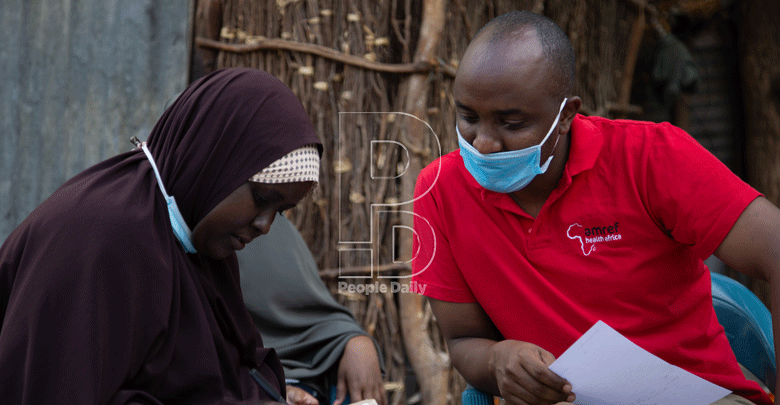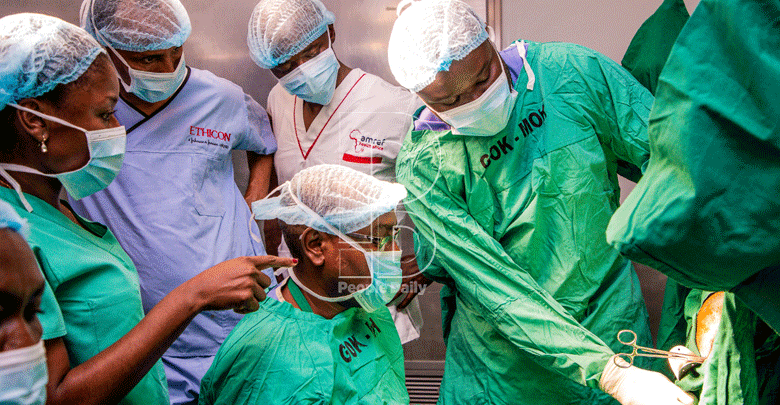Fighting obstetric fistula in Northern Kenya
By Jasmine Atieno, May 24, 2021Jasmine Atieno @sparkleMine
Obstetric fistula, which is a hole between the birth canal and bladder and/or rectum, is one of the most serious and tragic childbirth injuries.
It leaves women with incontinence problems, and often leads to chronic medical problems, shame, depression and social isolation and deepening poverty.
An obstetric fistula occurs when a mother has a prolonged, obstructed labour, but doesn’t have access to emergency medical care, such as a caesarian section.
During her prolonged labour, the mother’s contractions continually push the baby’s head against her pelvis. Soft tissues caught between the baby’s head and her pelvic bone become compressed, restricting the normal flow of blood.
Without adequate blood supply, sections of tissue soon die, leaving holes known as “fistulae” between the mother’s vagina and her bladder or rectum. It is these holes that cause incontinence.
If untreated, the woman will uncontrollably leak urine, stool, or sometimes both, for the rest of her life.
Safe motherhood
Amref Health Africa’s Obstetric Fistula programme, established in 1992, aims at improving the quality of life for women with debilitating childbirth injuries through surgical and community interventions.
Since its inception, the programme has been involved in large scale surgical interventions targeting women and girls with obstetric fistula.
Through the Fistula Programme, Amref Health Africa started Safe Motherhood project in 2016, which holds annual free obstetric fistula surgeries in three counties; Marsabit, Turkana and Garissa.
“Research proved that the three counties had the highest rate of maternal mortality rate so we saw that there was a need for this project to be supported.

The health project aims to support capacity of health workers and also enable sensitisation on safe motherhood on three levels; pre-operative, post-operative and follow up,” shares Dr Galgallo Golicha, project officer, Safe Motherhood-Amref Health Africa.
Causes of obstetric fistula include injury during childbirth, cancer, radiation therapy and surgical complications.
While all expectant mothers might be at risk of fistula, Dr Golicha shares that teenage mothers are at a higher risk.
The only treatment for this condition is repair through fistula surgery, a medical procedure that most of the victims cannot easily finance.
Safe Motherhood Programme has seen an increase in the demand for operations.
By providing on-job training and supportive supervision of rural health workers, the programme also gives city-based specialists the opportunity to practice rural medicine in resources-constraint settings.
“This initiative has been beneficial to the entire community. Through the county referral hospitals, we have been holding annual camps, which is also an opportunity to bring specialists from Nairobi to do surgeries within the region.
This offers on-job training to the health volunteers and medical trainees on the ground,” added Dr Galgalo.
The community health volunteers (CHVs) are at the core of this programme ensuring that the communities are well informed to be able to make appropriate choices in pregnancy, delivery and post-delivery, creating demand for maternal health services.
This partnerships with communities, county authorities and the national government provides avenues for reducing the existing disparities in health care affecting the poorest communities and have shown the need to build bridges between communities and health systems as well as the need to develop institutional capacity to improve health and reduce poverty.
Challenges brought by pandemic
The project officer shares though that the pandemic has greatly affected the output of sensitisation.
“Fistula camps are normally an opportunity for many women who have any maternal health issues to get medical help for free.
This normally gathers quiet a crowd. But we have had to break this into two to break the crowd.
Garissa County Referral Hospital has two fistula surgeons and nurses so that the patients can still access surgical operations.
Another station is situated at Kapenguria Referral hospitals so even the people from Turkana can access the facility easily,” he said.
Meanwhile, Amref Health Africa in partnership with other healthcare providers commemorated the International Day to End fistula at a national event, at Kenyatta National Hospital yesterday.
The event that also had a medical camp saw over 30 patients receive free fistula surgery.
While the previous years would have seen medical camps in Marsabit, Turkana and Garissa, this was not possible this year, inconvenienced by the Covid-19 pandemic.
